About Co-op Programs
Since 1975, Wentworth Institute of Technology has offered one of the most robust and comprehensive cooperative education (co-op) programs for college students in the United States. These transformative opportunities allow students to forge real-world work experience at some of the nation's top companies while integrating the knowledge they learn inside the classroom.
By answering your questions, we aim to educate you about co-op programs in general and Wentworth’s specifically. Learn about the ins and outs of co-op programs and how they can help you graduate well-prepared for today's workforce.
- Co-op Data for Wentworth Students
- How does a co-op program work?
- Are co-op programs worth it?
- Co-ops vs. Internships
- Do people get paid for co-ops?
- Does co-op affect financial aid?
- Does co-op delay graduation?
- How does cooperative education benefit students?
- What GPA do you need for a co-op?
- What is an example of cooperative education?
- Why are co-op programs important?
- Why do companies hire co-op students?
Co-op Data for Wentworth Students
How Does a Co-op Program Work?

Co-op programs are designed to provide students with practical work experience in their field of study while still in school. The specific structure of a co-op program can vary depending on the institution and program, but here‘s how a co-op program typically works:
✓ Applying
Students who are interested in participating in a co-op program complete any required coursework, training, or other program requirements before beginning their co-op. This may involve attending orientation sessions, completing safety training, or developing a resume and cover letter. Then, they complete a job search and apply to co-op employers to secure a position.
At Wentworth, starting in Fall 2026, students will be required to complete Introduction to Cooperative Education, a class that prepares students for the co-op search and success on the job.
✓ Full-time Employment
Once students have completed their prep, they begin the process of securing a co-op. This may involve working with a dedicated career development office at their institution, attending career fairs, or networking with professionals in their field. Co-ops can range from a few months, an academic year, or a full year (depending on the program) and may involve working for one organization or multiple organizations. At Wentworth, co-ops are built into the curriculum and are required to graduate. All Wentworth students complete two co-ops, usually one in their junior year and one in their senior year, in addition to eight semesters of classes.
Wentworth students are assigned a Co-op & Career Advisor based on their program of study. This Advisor assists students with resume and cover letter development, job searches, application materials, interview prep, and more.
✓ Work and Study
During their co-op, students typically work full-time at the organization, applying what they've learned in the classroom to on-the-job projects and tasks. While working, students also continue to study and complete assignments related to their co-op. This helps to integrate the practical and theoretical aspects of their education.
At Wentworth, students work full-time on their co-op for the duration of the semester, applying what they have learned in the prior semesters and bringing what they have learned in the workplace, back to the classroom.
✓ Evaluation
At the end of their co-op, students are typically evaluated by their supervisor and/or academic advisor. This evaluation may include feedback on their work performance, as well as reflections on what they've learned and how they can apply their experience to future academic and career goals.
At Wentworth, students submit a self-evaluation of their performance and their supervisor submits an evaluation of the student. Both evaluations are required for a student to receive their grade.
Co-op programs provide students with a valuable opportunity to gain practical work experience and enhance their employability. By alternating between periods of work and study, students can apply what they've learned in the classroom to real-world settings and develop a deeper understanding of their field of study.
Are co-op programs worth it?
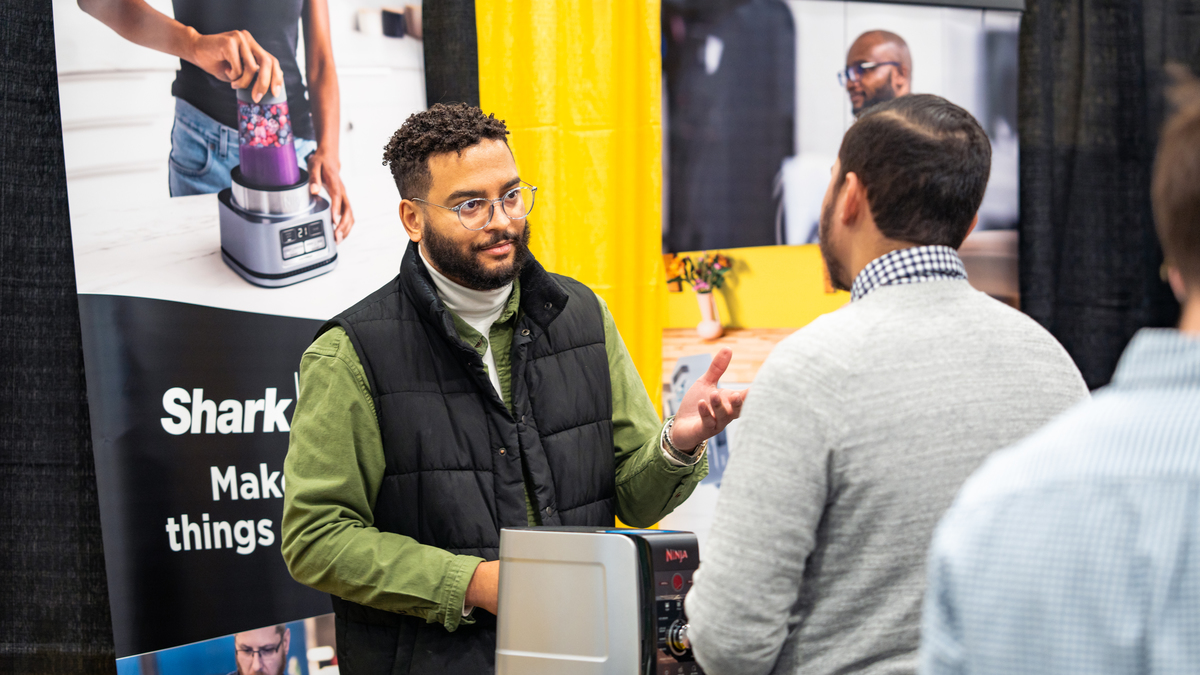
Co-op programs offer students a unique opportunity to gain practical job experience while still in school. These programs typically require students to alternate between periods of full-time work and full-time learning experiences, giving them a chance to apply what they've learned in the classroom to real-world settings. While co-op programs can be challenging and require a significant time commitment, students find them to be well worth the effort.
A major benefit of co-op programs is that they can greatly enhance students' employability after graduation. By gaining practical work experience in their field of study, students can demonstrate to potential employers that they have the skills and knowledge necessary to succeed in the workplace. Co-op programs can also help students build a professional network, which can be invaluable when searching for jobs.
Because of Wentworth's co-op program, 95% of our graduates (that we have data on) are employed or going to graduate school within six months of graduation. Another benefit is that students in co-op programs can get a clearer sense of their career goals and interests. By working in different environments and roles, students gain an understanding of what they enjoy and excel at, as well as what they may want to avoid in their future careers. This can be valuable when it comes to making decisions about post-graduation plans.
For students who are willing to put in the time and effort, co-op programs can be a valuable investment in their future careers. At Wentworth, every undergraduate day student completes two co-ops.
Co-ops versus Internships

Co-ops and internship programs are both forms of experiential learning and professional development that provide students with opportunities to gain practical work experience and apply their classroom learning in real-world settings. There are some key differences between these two programs, however, and understanding these differences is important for students looking to choose one or the other.
Co-op programs typically require students to alternate between periods of full-time work and full-time study, while internships are generally shorter-term and do not involve a structured alternating schedule. At Wentworth, most students complete their first co-op in the spring of their junior year and their second in the fall of their senior year. Since Wentworth students graduate within four years, juniors and seniors are taking classes full-time during their last two summers, except for a few majors.
Co-op programs also tend to be more formalized and structured, with students typically receiving academic credit and often being paid for their work, while internships can be more flexible and less formal.
Another key difference between co-op and internships is the level of integration between work and academic study. In co-op programs, students are employed by their co-op organization and assigned work just like a regular employee. Working full-time allows co-op students to delve into comprehensive projects for their employers. At Wentworth, students set three learning goals before their co-ops begin, which must be substantive and actionable. At the end of the semester, students and employers complete an evaluation where students reflect on those learning goals. This reflection is an essential component of the co-op experience.
Internships may involve some similar academic components, but they are typically less integrated with students’ academic coursework. Additionally, co-op programs often involve a deeper level of involvement with the host organization, as students may work with the same organization for multiple terms and may have more extensive responsibilities than interns.
Both co-ops and internships can be valuable for students seeking to gain practical work experience and enhance their employability. The choice between these programs may depend on factors such as the student’s academic program, career goals, and personal preferences. Co-op programs may be particularly beneficial for students seeking a more structured and integrated work-study experience, while internships may be a better fit for those seeking more flexibility and a shorter-term commitment.
Do People Get Paid for Co-ops?

In most cases, students get paid for co-ops. Co-op programs are typically designed to provide students with paid work experience in their field of study. The amount of pay can vary depending on the industry, location, and specific program.
Note that not all co-ops are paid. Some programs may offer unpaid or stipend-based co-ops, particularly in fields such as non-profit or government work.
When researching co-ops, it's important to carefully review the program's policies regarding pay and compensation. If pay is a significant factor in your decision to participate in a co-op program, you may want to consider programs that have a track record of helping students secure well-compensated positions.
Does Co-op Affect Financial Aid?

Participating in a co-op program can potentially affect financial aid, but the impact can vary depending on the specific program and the policies of the institution. Here are some factors to consider:
Enrollment Status
To receive financial aid, students are typically required to maintain a certain enrollment status, such as full-time or half-time. At some schools, a co-op may require students to take a break from their academic coursework, which could impact enrollment status and therefore their financial aid eligibility. However, Wentworth co-op programs integrate academic coursework and work experience into each major. Every undergraduate student graduates from Wentworth with at least two semesters of co-op experience, which is built into the program and, thus, doesn’t affect enrollment status. Students remain in full-time status while participating in co-op.
Earnings
If a co-op is paid, the earnings may be counted as income when determining financial aid eligibility. Students who earn a significant amount during their co-op may have their financial aid adjusted. In general, the compensation that co-op students receive is fully taxable. The employer is required to deduct Worker’s Compensation, Social Security (FICA), Federal Withholding Tax and State Income Tax.
Program Policies
Each institution and co-op program may have different policies regarding financial aid and co-op participation. It's important to carefully review the policies of the program you're interested in and to discuss any potential impacts on financial aid eligibility with the financial aid office at your institution. At Wentworth, you'll be assigned a Financial Aid Counselor. We recommend that students contact their counselors to discuss how their co-op earnings may impact financial aid awards.
Does Co-op Delay Graduation?
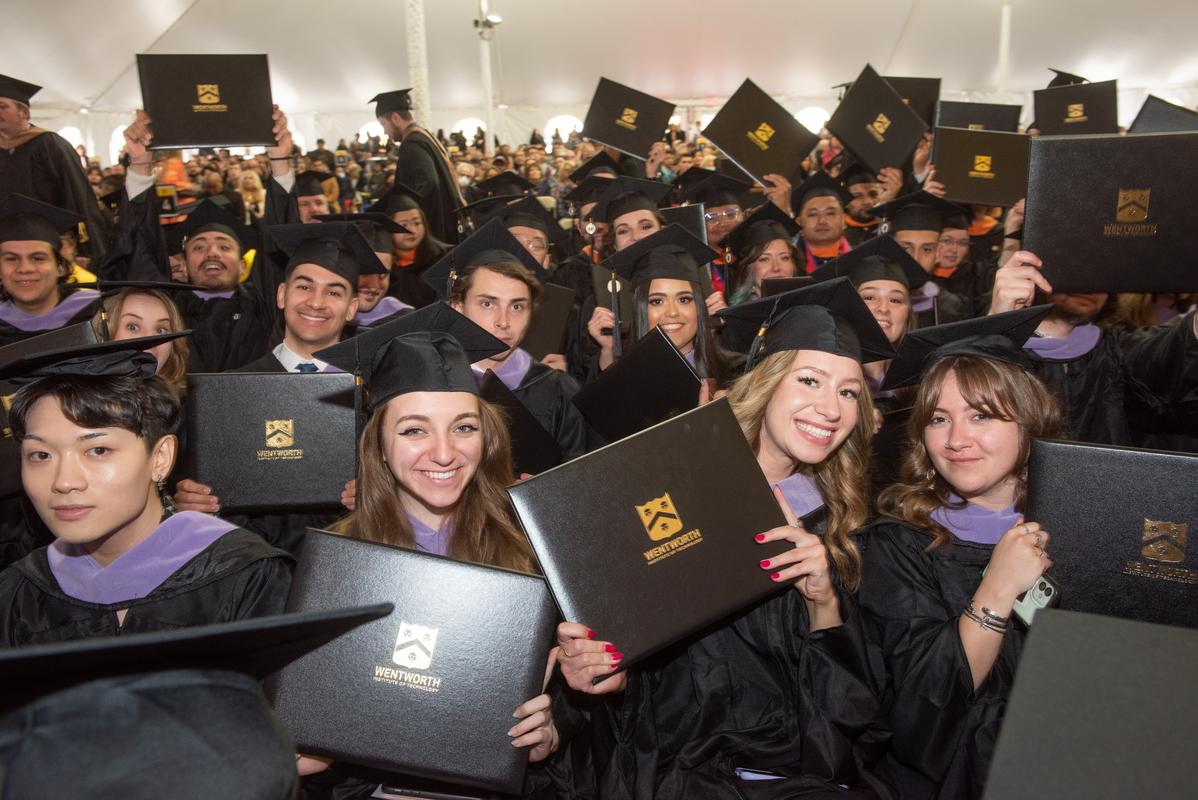
Participating in a co-op program may or may not delay graduation, depending on the specific program and the policies of the institution. Here are some factors to consider:
Length of Co-ops
Co-op programs may require students to take a break from their academic coursework to complete a work term. The length of the work term can vary depending on the program and the employer, but it is typically between three and eight months. Wentworth co-ops are integrated into each program and replace 2 semesters of academic coursework.
At Wentworth, two co-op semesters are scheduled for every undergraduate day student. Most students participate in their first co-op in the spring of their junior year and the second in the fall of their senior year, depending on their major. Students following this academic schedule usually take a full semester of classes in their last two summers and graduate in August. Unlike other co-op schools, Wentworth students can graduate in four years.
Academic Credit
Many co-op programs are designed to integrate academic coursework and work experience, meaning that students receive academic credit for their co-ops. In some cases, this credit can count towards the requirements for graduation, which means that co-op participation may not necessarily delay graduation.
At Wentworth, co-op registration ensures students remain in full-time status. However, the co-op classes are zero credit, meaning there is no tuition paid to Wentworth during these semesters. Additionally, Wentworth has no fees associated with co-op. Therefore, these semesters are no-charge to the students, with the possible exception of housing and health insurance costs.
Program Policies
Each institution and co-op program may have different policies regarding graduation requirements and co-op participation. It's important to carefully review the policies of the program you're interested in and to discuss any potential impacts on graduation with your academic advisor.
While at some schools, participating in a co-op program may potentially delay graduation, Wenworth’s 2 co-op semesters do not affect the typical timeline for program completion. The long-term benefits of gaining practical work experience in one’s field of study can help to improve a student’s employability and provide valuable professional networking opportunities.
How Does Co-op Education Benefit Students?
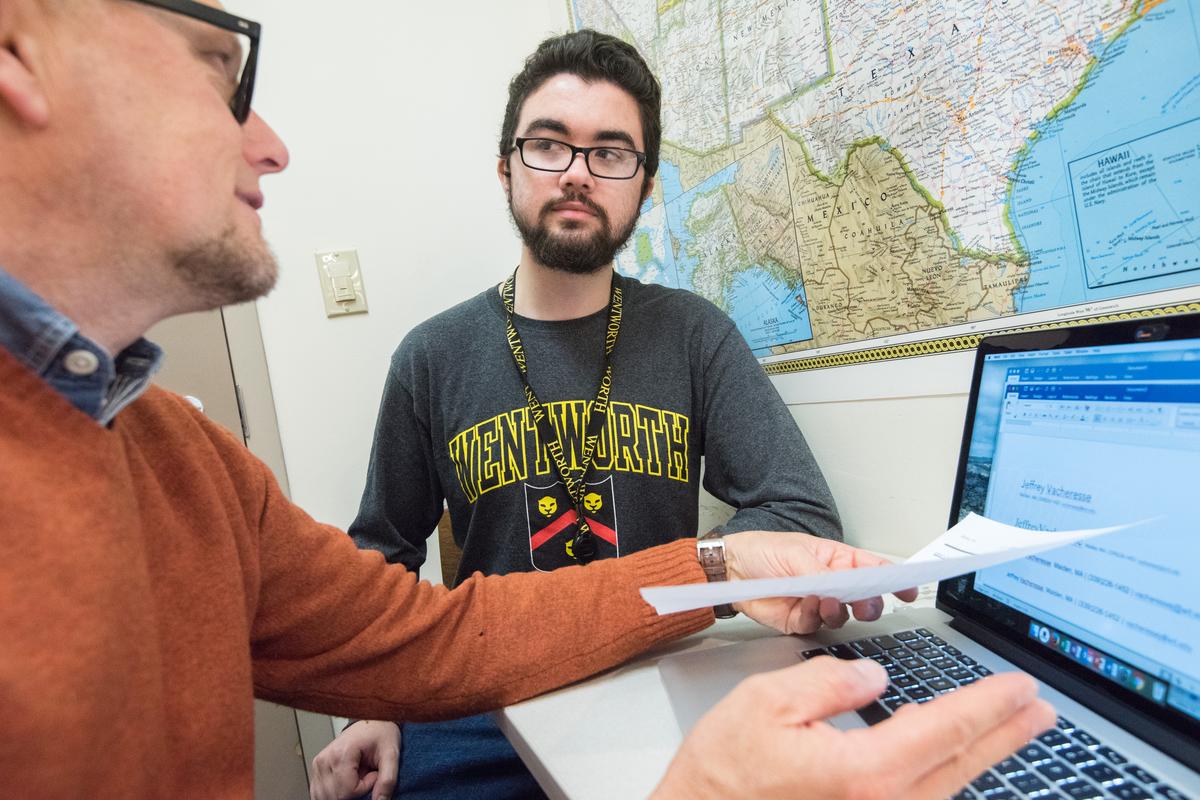
Co-ops provide several benefits to students, including:
Practical Work Experience
Co-op programs allow students to gain practical work experience in their field of study while still in school. This can help students apply what they've learned in the classroom to real-world situations, develop important skills, and build their resumes.
Enhanced Employability
By participating in a co-op program, students can improve their employability by gaining relevant work experience and developing skills that are in high demand by employers. Co-op programs also provide opportunities for students to network with professionals in their field and potentially secure job offers upon graduation. Because of Wentworth's co-op program, 95% of our graduates (that we have data on) are employed or going to graduate school within six months of graduation.
Academic Integration
Co-op programs are designed to integrate academic coursework and work experience, allowing students to see the practical application of what they're learning in the classroom. This can help to deepen their understanding of their field of study and enhance their academic performance.
Personal Growth
Co-op programs provide opportunities for students to develop important personal and professional skills, such as communication, problem-solving, and teamwork. These skills can be valuable in all aspects of their lives, both personally and professionally.
Financial Benefits
Many co-op programs offer paid work experience, which can help students to offset the cost of their education and reduce their student loan debt.
In a job market that increasingly favors practical experience over theoretical knowledge, the benefits of co-op programs can bolster graduates' employability and ultimately contribute to their success in their chosen fields.
What GPA Do You Need for Co-op?
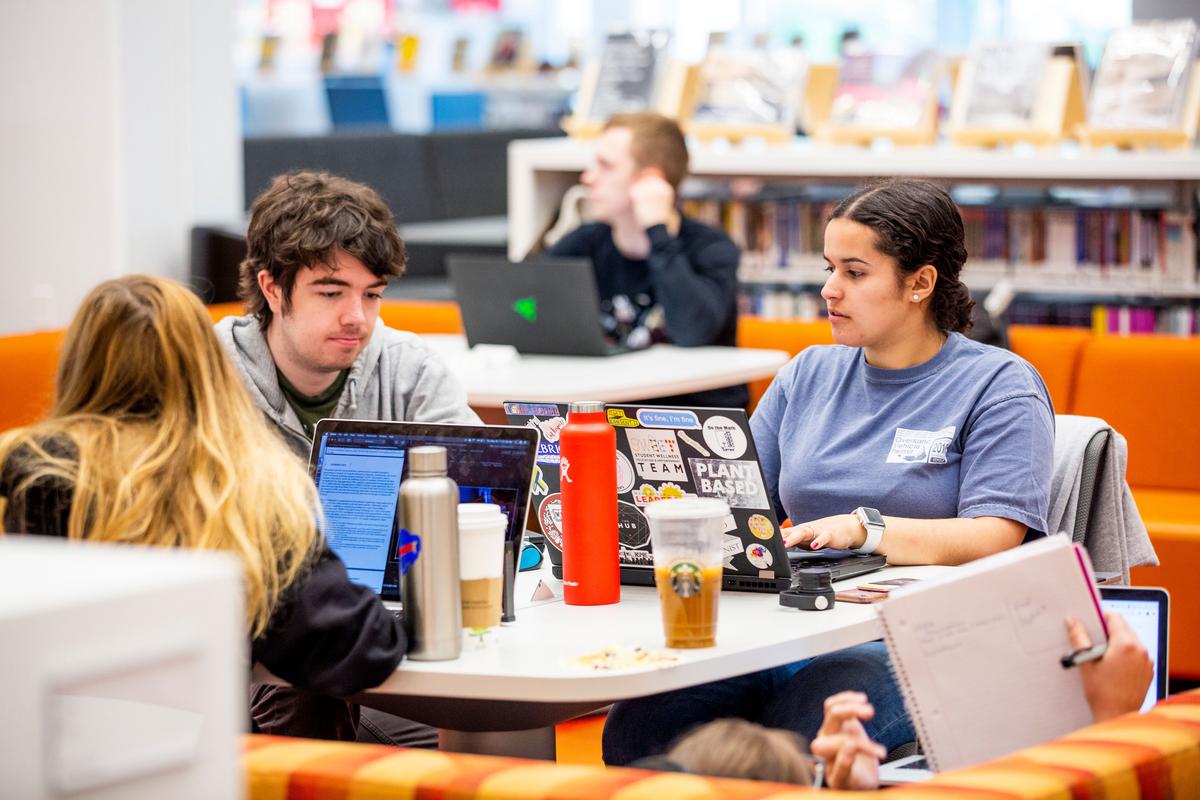
The minimum GPA requirement for co-op programs can vary depending on the institution and program. Some programs may require a minimum GPA of 2.5 or 3.0, while others may have higher requirements, such as a 3.5 or above. Wentworth’s minimum cumulative GPA requirement is 2.0.
Remember that GPA is not the only factor that co-op employers consider when evaluating applicants. Many employers also consider a student's work experience, extracurricular activities, and overall academic performance.
What is an Example of Cooperative Education?

One example of cooperative education, or co-op, is a program in which students alternate between academic coursework and work experience related to their field of study. For instance, a Wentworth computer science major will spend 5 semesters taking academic coursework, followed by a semester-long co-op working as a software developer at a technology company. They will then return to Wentworth for another semester of coursework followed by a second co-op, which could be at the same company or a different one.
During the work terms, the student would gain practical experience by working on real-world projects alongside industry professionals. This experience would be integrated with academic coursework, which would provide a deeper understanding of the theory and concepts related to computer science.
Throughout the program, the student would receive academic credit coursework and their co-op will appear as an additional item on their transcript.
At the end of the co-op program, the student has gained valuable work experience, built a network of industry contacts, and potentially secured a job offer after graduation. Cooperative education programs provide students with a unique opportunity to gain practical work experience while still in school, which can have a positive impact on their academic and career paths. Wentworth is one of the few schools in the nation that require two co-ops for every undergraduate day student. Your peers will have similar experiences at the same time.
Why are Co-op Programs Important?
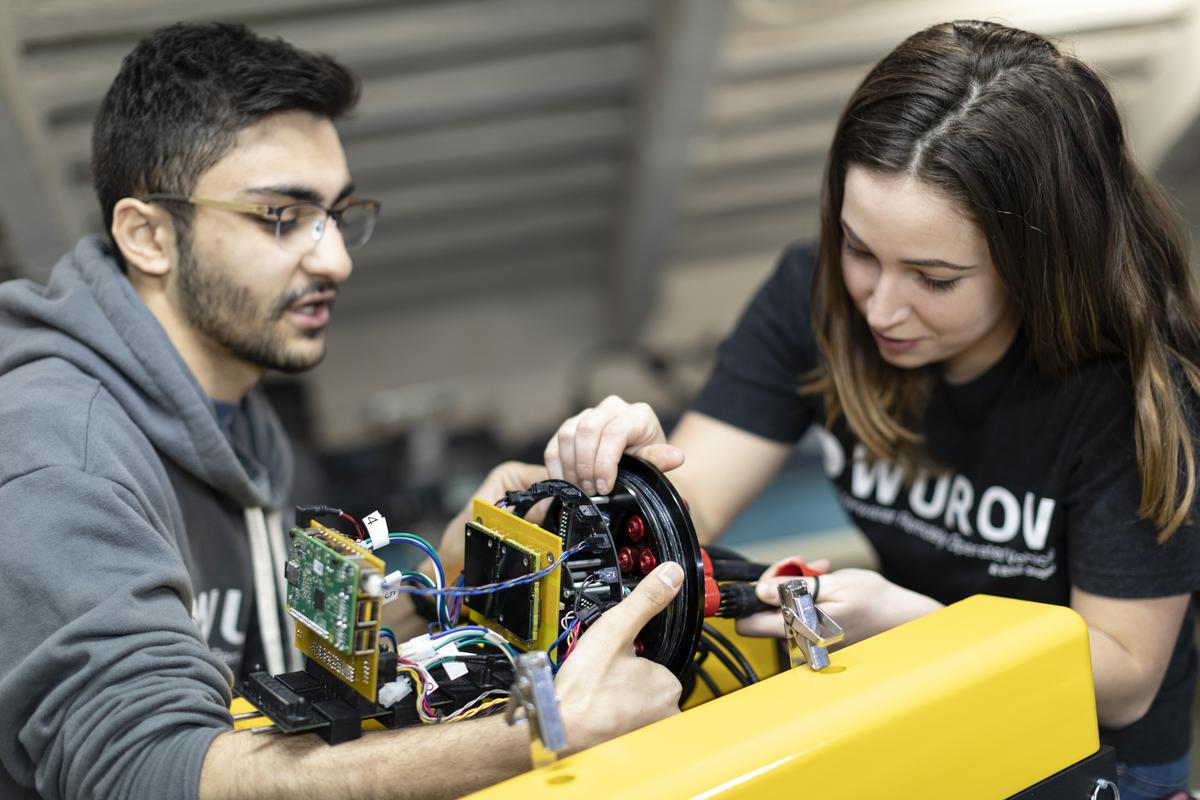
Cooperative education programs, commonly known as co-op programs, are a form of experiential learning that integrates academic knowledge with work experience. In a co-op program, students alternate between attending classes and working in related fields, gaining practical experience while studying. Co-ops provide students with valuable hands-on experience, exposure to real-world scenarios, and an opportunity to build their professional network.
Most employers require more than just theoretical knowledge, they increasingly look for practical professional experience. Co-op programs bridge the gap between classroom knowledge and practical skills, providing students with the opportunity to apply what they have learned in the classroom to real-life scenarios. The students can explore different areas of their field, develop new skills, and gain industry-specific knowledge. These experiences not only provide a competitive advantage but also prepare students for their careers.
Students in co-op programs are introduced to the actual challenges and complexities of the industry, which helps them gain a deeper understanding of the profession they are pursuing. They gain a realistic insight into the industry's expectations, the work culture, and the various job roles available. Moreover, co-op programs expose students to different work environments, including different organizational cultures, management styles, and team dynamics. These experiences can be invaluable in helping students make informed career choices.
Through co-op programs, students are also exposed to different professionals in their field, including their co-workers, managers, and mentors. These relationships can be beneficial for future job opportunities, references, and career advice. Students who participate in co-op programs are better prepared for the workforce, have a deeper understanding of their field, and are more likely to find success in their careers.
Why Do Companies Hire Co-op Students?

There are several reasons why companies choose to hire co-op students:
Access to Talented Students
Co-op programs are typically designed to attract talented students who are pursuing degrees in fields that are in high demand. Companies can benefit from the fresh perspectives and innovative ideas that these students bring to their organizations.
Cost-Effective Recruitment
Hiring co-op students can be a cost-effective way for companies to recruit and train new talent. By participating in a co-op program, students gain practical work experience that prepares them for future employment, which can make them more attractive job candidates once they graduate.
Long-Term Benefits
Companies that hire co-op students may also benefit from a long-term relationship with the institution that hosts the program. By building a positive reputation among co-op students and faculty, companies can establish a pipeline of talent that they can draw from in the future.
Diverse Perspectives
Co-op programs often attract a diverse pool of students from different backgrounds and cultures. By hiring co-op students, companies can benefit from this diversity of perspectives and experiences, which can help to foster innovation and creativity within the organization.
Hiring co-op students can be mutually beneficial for both companies and students. Companies gain access to talented and motivated individuals who can contribute to their organizations, while students gain practical work experience and a deeper understanding of their field of study.
